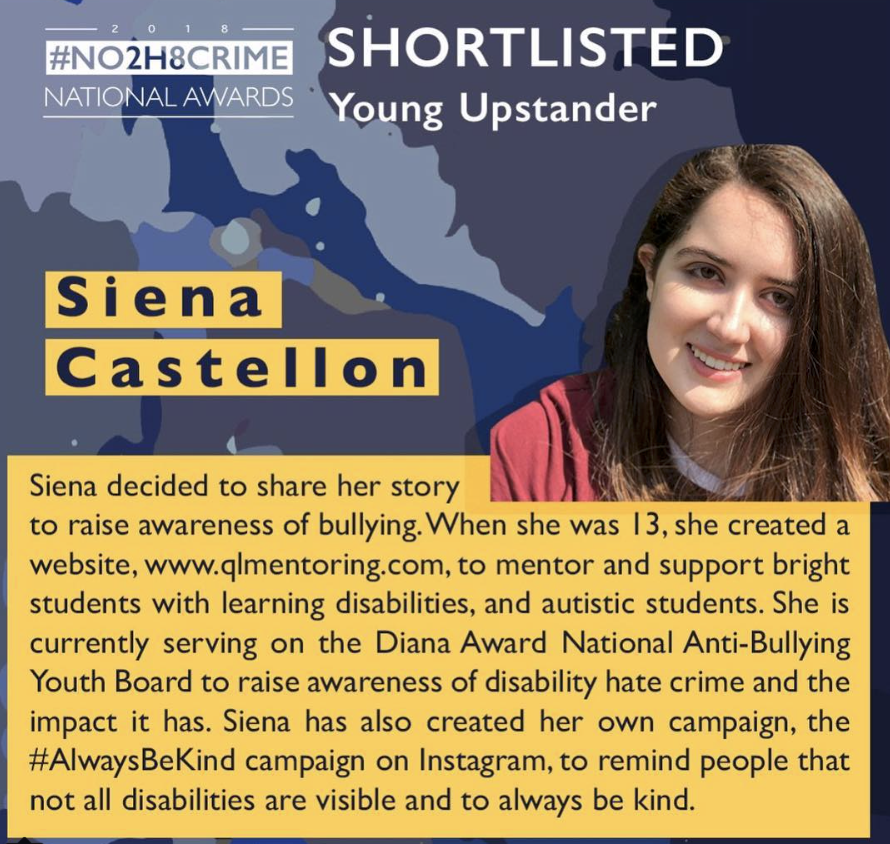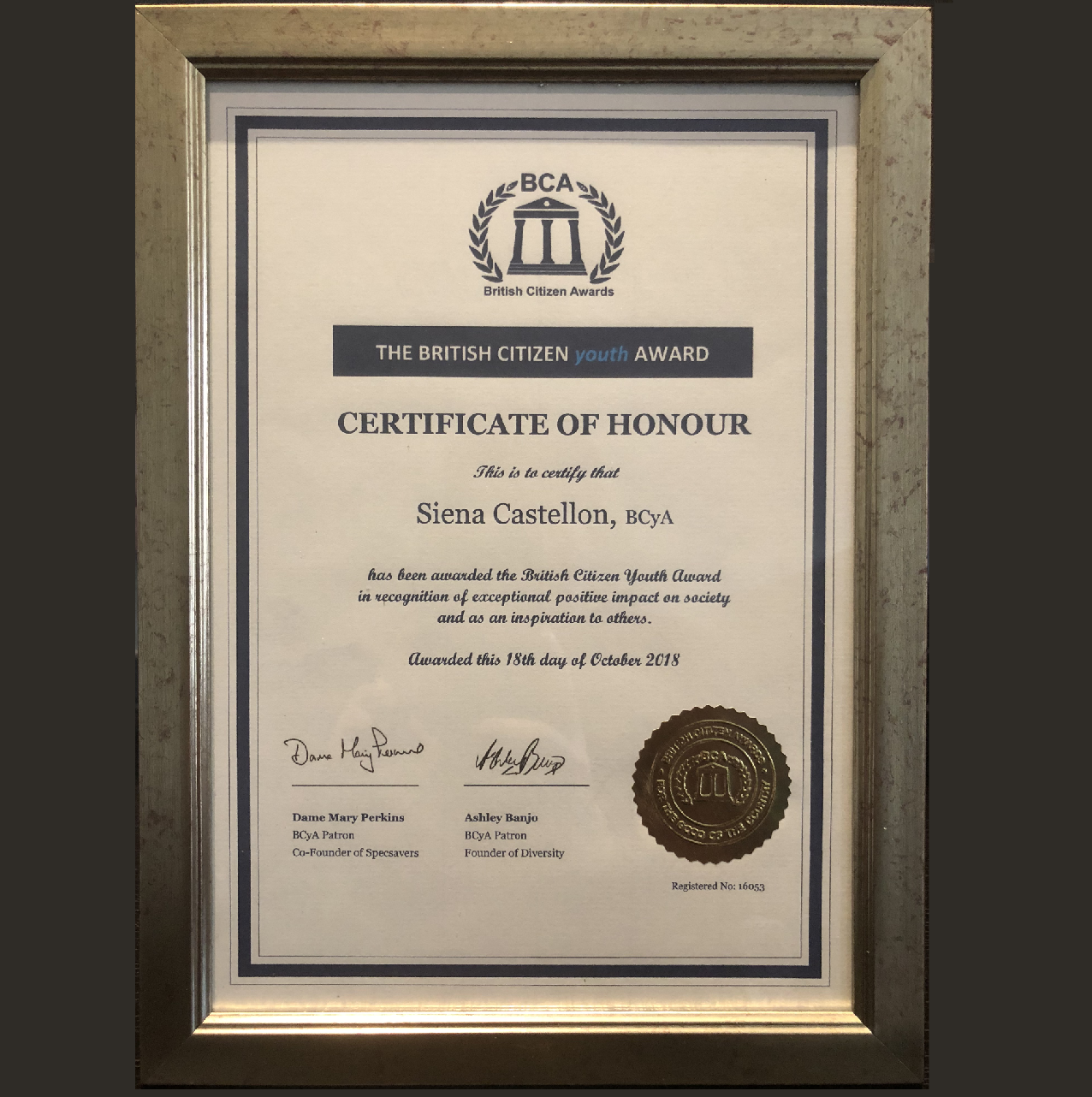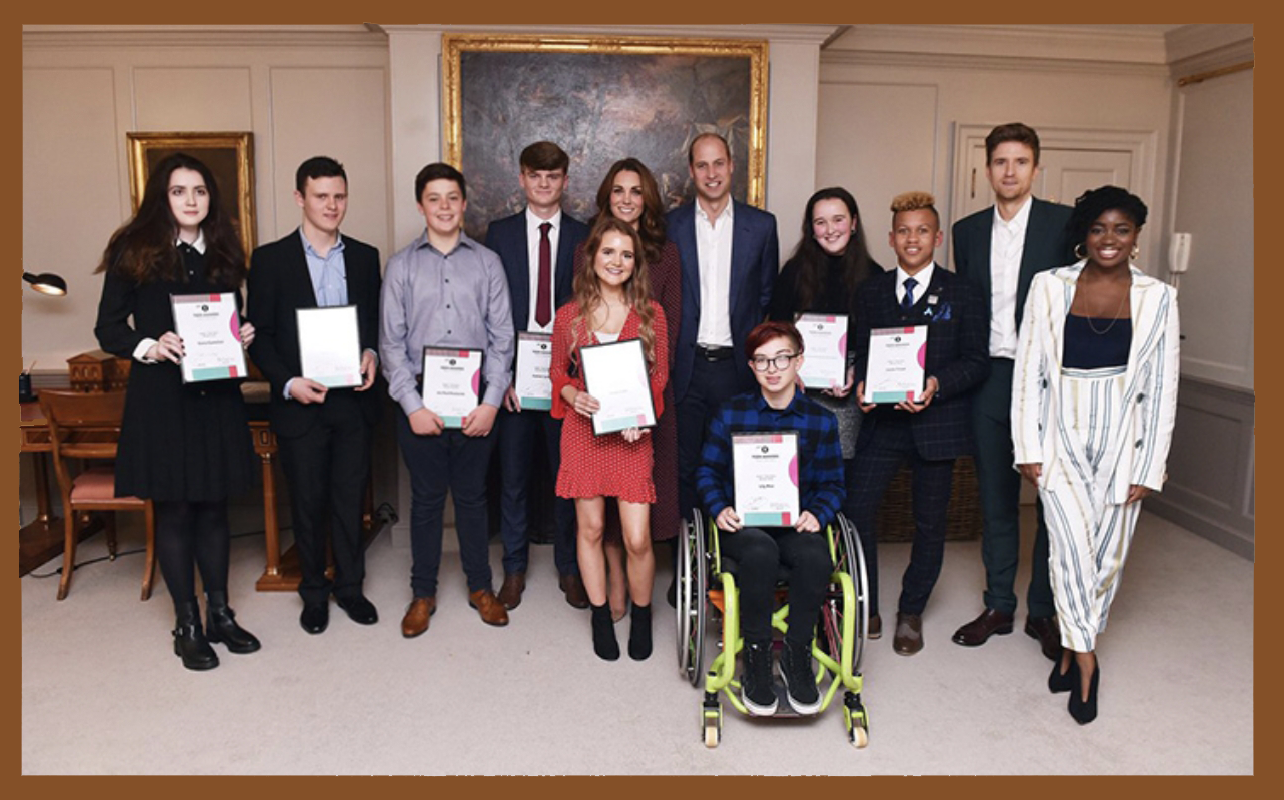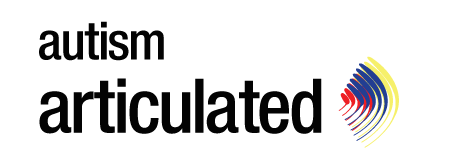Meet Siena Castellon
/Siena Castellon is a 16-year-old, London-based neurodiversity advocate and anti-bullying campaigner. She’s also the founder of Quantum Leap Mentoring, a website that mentors students with autism, dyslexia, ADHD, and other learning differences. Siena has won numerous awards for her advocacy and website, including the British Citizen Youth Award and the BBC Radio 1 Teen Hero Awards. In this profile, check out her insights on how to end bullying, her advice for individuals on the autism spectrum, and more!
Tell us about yourself.
I am 16 and from London, England. I love math and physics. Since I was 10, I have been going to summer programs in the United States designed for gifted children. I studied university-level math and physics at programs, such as Stanford University’s Pre-Collegiate Summer Institutes and Johns Hopkins University’s Center for Talented Youth. These residential summer programs were transformative. I was not only taught fascinating information not typically taught at school, but for the first time in my life I met other children like me. It was the first time that I felt accepted and that I belonged. Last summer, I spent two weeks studying theoretical physics at Perimeter Institute in Waterloo, Canada and had a one-week physics work placement at Cambridge University’s Cavendish Laboratory.
In addition to being a math and physics nerd, I also conduct autism research at UCL’s Centre for Autism in Research and Education (CRAE). I believe it is very important for the autistic community to have an active role in autism research. By involving the autism community, scientists can ensure that the research being conducted meets our needs and is focused on improving the understanding of autism and our quality of life, instead of being misdirected into trying to find an autism cure.
I am also very passionate about increasing the understanding and acceptance of autism and neurodiversity and addressing disability-related bullying. I frequently give talks on the importance of Diversity in STEM, including a recent talk at the SpotOn Conference at the Francis Crick Institute. In January, I will be giving a talk on Diversity in STEM at Imperial College. Currently, diversity is mainly focused on gender equality and racial / ethnic equality. I am focused on expanding diversity to also include the neurodiverse community; a community made up of people who are dyslexic, dyspraxic, autistic, have ADHD or who have other conditions that give them a different perspective through which they interact and perceive the world.
When were you diagnosed with autism? What challenges did you face and what support systems did you embrace?
I was diagnosed as being autistic when I was twelve. I had already been diagnosed with mild dyslexia and dyspraxia (a motor co-ordination disorder). As is the case with many girls, I was diagnosed in a roundabout way. A physiotherapist noticed I was very sensitive to touch and had a low pain threshold. She referred me to cognitive behavioural therapist for pain management. It was the cognitive behavioural therapist who identified that I am autistic and who referred me to someone who specialises in diagnosing autistic girls.
Although it was a huge relief to finally have an explanation as to why I had always been “different,” I did not receive any additional support at school. I was still very much on my own. My school’s staff and my teachers had very little understanding of autism, especially in relation to autism in girls. They had very little understanding of my sensory processing disorder or of my social anxiety. In many respects, not much changed. I was still misunderstood and still required to mask at school.
I wish there had been some resources available that were specifically aimed at supporting autistic girls. All the resources I found were written by adults, were aimed at parents of autistic children and focused on supporting autistic boys. I am thrilled that I recently accepted a publishing deal with Jessica Kingsley Publishers to write a survival guide for autistic teen girls. I intend to write the type of informative and practical guide that I wish had been available when I was growing up. We still have a long way to go before autistic students are adequately supported.
What is Quantum Leap mentoring and what inspired you to create this platform to support and mentor young people with neurodiversity?
Quantum Leap Mentoring is a website I created when I was thirteen. When searching the Internet for information about my conditions, I found that all the information about autism, dyslexia, dyspraxia and ADHD was aimed at the parents of autistic children and children with learning differences. There was no information aimed at supporting us. I decided to change this by creating a website specifically designed to support and mentor autistic young people and young people with learning differences. On my website, I provide practical advice and share the tips and tricks I used to overcome some of the challenges caused by my autism and learning differences. I also provide bullying advice.
I currently have about 700 subscribers. I was recently contacted by a sixteen-year old girl who had initially accessed my website to find out more about dyslexia, a condition she had just been diagnosed with. However, when she was on my website she also decided to read the sections on dyspraxia and autism and realised she had these conditions too. She contacted me to tell me that because of my website she had already been diagnosed with dyspraxia and was in the process of being diagnosed with autism.
Disability hate crimes and abuse toward individuals with autism are woefully underreported. As an anti-bullying campaigner, what do you think needs to change and how can we effectively combat bullying?
Sadly, disability hate crimes are on the rise. The latest police statistics show a 33% increase in disability hate crime across England and Wales from 2017 to 2018. I suspect that the actual statistics are much higher. In a recent large-scale bullying study, 75% of autistic students reported being bullied. I am one of those students.
I have been bullied at school for most of my life. There have been occasions where the physical and verbal abuse was so severe that I had to change schools three times. This was not only disruptive to my education, but was also really damaging to my self-esteem, confidence and emotional and physical wellbeing. My last bullying experience was so devastating that it almost broke me. Luckily, a few weeks after I left the school where I was last bullied, I attended an inspirational talk by Facebook COO Sheryl Sandberg and Malala. The talk was about how life rarely goes to plan, the importance of resilience and how sometimes our Plan B turns out to be better than our Plan A. I left the talk resolved to stop being a victim and to use my bullying experience as motivation to make a positive difference in the world. Soon after, I applied to serve on the Diana Award National Anti-bullying Youth Board. I am currently serving on the Youth Board, representing over 28,000 anti-bullying ambassadors across the United Kingdom. I have used my time on the Youth Board to raise awareness of disability-related bullying.
Although all schools claim to have a zero-tolerance bullying policy, the reality is very different. My experience and the experience of many other autistic students is that when we claim to be bullied schools either don’t believe us or they blame us. I have lost count of how many times I was told that I needed to stop being so “different” and that I needed to make more effort to “fit in.” Schools need to stop blaming the victim and condoning the bullying of students who are different, whether that be due to their religion, ethnicity, gender or disability.
Instead, schools should be focusing on teaching their students to be tolerant, kind and accepting of others. Schools should be empowering students to embrace who they are. It is wrong for schools to tell autistic students to stop being themselves, because they are basically telling us that we have to pretend to be someone we are not. This can lead to mental health issues and a sense that there is something wrong with us that makes us unworthy of being accepted for who we are.
I think the most effective way to combat bullying is for schools to implement their zero-tolerance bullying policy and for schools to focus on teaching their students to be kind and accepting of others. Schools need to shift their focus from trying to force everyone to be the same, to being inclusive and accepting of diversity. Schools should also encourage their students to be Upstanders, to stand up and speak out when they see an injustice. One of the most traumatic aspects of my bullying experience was the number of passive bystanders who witnessed the abuse and said and did nothing. Schools play a powerful role in creating the adults of tomorrow, they have a responsibility to teach their students to respect the law and to stand up against the abuse of the most vulnerable members of their community.
What has been your proudest moment in your incredible journey as an autism and neurodiversity advocate?
I have had a quite a few proud moments. Being invited to a private reception at Kensington Palace by the Duke and Duchess of Cambridge was a highlight. Another highlight was being invited to Downing Street to talk about anti-bullying. Also, winning the BBC Radio Teen 1 Awards on national TV and in front of 10,000 screaming teenagers, was surreal, as was getting a personalised video from my favourite singer of all-time, Lana Del Rey and a signed Harry Potter book from JK Rowling. All of these moments were definitely pinch yourself moments.
However, my proudest moments are the quiet moments outside of the limelight. I recently started a new school campaign called Neurodiversity Celebration Week which aims to encourage schools to recognise and celebrate the many strengths of their neurodiverse students. As a student who is dyslexic, autistic, dyspraxic and has ADHD, I know how demoralising and frustrating school can be. We are constantly being reminded of what we are bad at and what we struggle with. This can have a very negative effect on our self-esteem and confidence.
Furthermore, there are still so many misconceptions about what it means to have a learning difference. Many students assume you are not smart. I hope to change this by flipping the narrative. I hope that by having schools celebrate our strengths, such as our creativity, innovation, problem-solving skills and resilience, that I can begin to change the way in which students like me are treated and perceived.
No one tells us that 30% of entrepreneurs are dyslexic, that many of the most successful actors and musicians have ADHD or that some of the best scientists and mathematicians are autistic. Our unique way of perceiving the world and our insights and innovation can be huge assets that can make significant contributions to society.
In the first week since launching my Neurodiversity Celebration Week campaign, I have had 16 schools sign up to participate. This may not sound very impressive. However, it amounts to over 16,200 students!!! Furthermore, my campaign has been embraced internationally. Schools in Australia and the United States have signed up. I have also had a phenomenal response from charities and organisations. The ADHD Foundation, the Anna Kennedy Online charity, Autism Parenting Magazine and MenCap are endorsing my campaign.
If I can change the way neurodiverse students are perceived and treated at school and how they feel about themselves, that would definitely have to be my proudest moment.



If you could share one piece of advice for individuals on the autism spectrum, what would it be?
Be true to who you are. I know that this is easier said than done and that there is still a lot of stigma associated with being autistic, however, we all deserve to be accepted and understood. I have over 3,000 followers on Twitter, many of whom are autistic adults. Many have spent their lives masking and are very open about the emotional, mental and physical toll this pretence has had on them. I do not think you can be happy if you are suppressing your true self and pretending to be someone else. My hope is that the more people are open about being autistic, the more we will begin to tear down the walls of intolerance that are confining us. Future generations of autistic young people deserve to live in a world where they are understood and supported and are free to be who they are without prejudice or judgment.
You can follow Siena Castellon on Twitter and Instragram at @QLMentoring and her #AlwaysBeKind Instagram campaign at: @AlwaysBeKindCampaign. If you are a school you can sign up to her new neurodiviersity school campaign at: www.neurodiversity-celebration-week.com







